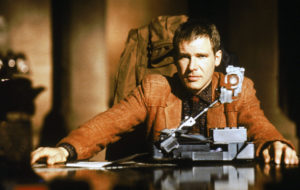“When the onset of universal night is finally acknowledged as irreversible”, warns a character in The Passenger, “even the coldest cynic will be astonished at the celerity with which every rule and stricture shoring up this creaking edifice is abandoned and every aberrancy embraced. It should be quite a spectacle.”
In the context of Cormac McCarthy’s new novel, this long harangue about America’s decadence at the close of the Seventies is slightly tongue-in-cheek, the barroom prattle of an ageing rake complaining about the strange new world emerging in the aftermath of the sexual revolution. But just because it’s a joke doesn’t mean we shouldn’t take it seriously. If there’s one consistent message in The Passenger, McCarthy’s first novel in 16 years, and its companion volume, Stella Maris, it’s that things are much worse than you think.
Such pessimism, of course, is not new ground for the 89-year-old McCarthy. Today, he’s probably best known as the author of No Country for Old Men, in which the most memorable character is a psychopathic killer who lectures West Texas hayseeds on fate and free will before puncturing their skulls with a cattle gun. Even that was relatively light fare, however. The book that got him on Oprah, 2006’s The Road, featured a father protecting his son from marauding bands of cannibals in the aftermath of what appeared to be a nuclear war. And his masterpiece, 1985’s Blood Meridian, which follows a band of American scalp-hunters murdering and pillaging their way through the US-Mexican borderlands, is one of the bleakest, goriest books ever written. Its central character is a gargantuan, hairless albino child rapist known as Judge Holden, who eggs on the group’s mindless bloodletting with Nietzschean speeches about the divinity of war.
The darkness of McCarthy’s subject matter, combined with a high-flown style that earns him comparisons to William Faulkner and James Joyce, has contributed to his legend as perhaps the greatest living American author, and certainly as one of a small handful who could accept a Nobel Prize without embarrassment. At a time when the dominant strain of American writing is still “autofiction” — claustrophobic frog-marches through the psychic landscape of the graduate-educated bourgeoisie — McCarthy’s epic, blood-drenched tales of the American South and Southwest are a throwback to a time when novelists wrote big books about big questions and had the temerity to think they could answer them. McCarthy has said he admires “gutsy” writers such as Dostoevsky and Melville, and elsewhere he has dismissed Proust and Henry James as “not literature” because of their failure to “deal with issues of life and death”. No one could level the same accusation against McCarthy. Death and violence are his great subjects, which he approaches with philosophical rigour and theological depth.
McCarthy is also many other things that most of our present-day writers are not. He is second only to his contemporary Thomas Pynchon for his reclusiveness, rarely granting interviews and almost always refusing to talk about his own work. His fictional worlds are overwhelmingly masculine in a way that might provoke critical scolding were he 40 years younger. And the worldview of his novels is decidedly reactionary, which is not to say that they are crudely political or interested in anything so vulgar as a defence of the bourgeois social order. Rather, his books are coloured by a sweeping scepticism toward all the improving efforts of mankind, which can never rescue us from the fundamental brutality of our nature. “There’s no such thing as life without bloodshed,” McCarthy told the New York Times in 1992, and the naïfs who allow themselves to believe in progress on this score “are the first ones to give up their souls, their freedom”.
Given this history, McCarthy’s latest novels are, for him, relatively subdued — in neither book is anyone shot through the head with a dragoon revolver or disemboweled by Apaches and hung upside down from a tree. There’s very little violence at all, and quite a lot of conversing about quantum mechanics and Kantian epistemology and mathematical topology, which McCarthy makes only half-hearted attempts to render comprehensible. (I confess I have a high tolerance for McCarthy’s brand of high-concept speechifying, but even I found myself wondering whether it was worth the trouble to look up “S-Matrix theory”.)
The Passenger and Stella Maris follow a pair of Tennessee-born Jewish siblings, Bobby and Alicia Western, whose father was a nuclear physicist who worked with J. Robert Oppenheimer on the construction of the atomic bomb. Alicia, whose conversations with her psychiatrist make up the entirety of Stella Maris, is a beautiful, schizophrenic math genius who commits suicide on page one of The Passenger. When we meet Bobby, it is 1980, eight years after Alicia’s suicide, and the former physicist is living an ascetic existence in New Orleans, socialising with roughnecks and barflies, still paralysed with grief over his dead sister. We soon learn that Bobby and Alicia were in love.
Early on, it seems as if The Passenger will become a thriller along the lines of No Country for Old Men. But a conspiracy concerning a mysterious plane crash and visits from government agents turns out to be a MacGuffin, serving only to create a persistent atmosphere of weirdness and threat. Most of The Passenger consists of Bobby going about his work and talking with family and friends about a range of chewy subjects. In Stella Maris, the action is dropped entirely — the book is a long series of dialogues between Alicia and her doctor about subjects like pure math, the philosophy of music, the ideas of Ludwig Wittgenstein, and the nature of mental illness. The recurring theme of these conversations, in both novels, is the impossibility of knowing anything — the unavoidable conclusion that, as Alicia puts it in a discussion of Richard Feynman’s over-sum theories, “human consciousness and reality are not the same thing”.
Given that McCarthy has apparently been working on these books for close to 20 years, one can’t help but wonder if the author at some point lost interest in his own premise in favour of the mind-bending scientific questions that consume Bobby and Alicia’s attention, and which are clearly objects of fascination for McCarthy. Some of Alicia’s dialogue in Stella Maris, for instance, is lifted in only slightly altered form from a 2017 essay, in which McCarthy suggested that language is a kind of parasite, transforming our unconscious into, as Alicia puts it, “a biological system under successful assault by human reason”. “In the end this strange new code must have replaced at least part of the world with what can be said about it”, she says. “Reality with opinion. Narrative with commentary.” It’s fascinating stuff, but it doesn’t particularly feel like something a 20-year-old girl would say in 1972, even if she were a math genius.
What ultimately holds the books together, in the absence of more conventional narrative structure, is a pervasive feeling that time is running out — for the doomed lovers Bobby and Alicia, and for America and Western civilisation. At one point midway through The Passenger, McCarthy writes that Bobby, whose parents met in 1943 at the nuclear laboratory in Oak Ridge, Tennessee, “fully understood that he owed his existence to Adolf Hitler. That the forces of history which had ushered his troubled life into the tapestry were those of Auschwitz and Hiroshima, the sister events that sealed forever the fate of the West.” McCarthy has long toyed with the idea that history moves in cycles, that civilisations reach a zenith and then decay, and that there is something self-undermining in man’s conquest of nature — consider the man-made apocalypse of The Road or the nuclear test explosion that closes The Crossing. “The noon of man’s expression signals the onset of night,” says Judge Holden in Blood Meridian. “His spirit is exhausted at the peak of its achievement.” Here that same exhaustion appears as righteous judgment on our own civilisation’s “peak”, the industrial slaughterhouses and nuclear infernos of the 20th century.
There is a curious passage in Stella Maris where Alicia’s therapist asks: “What do you think is the one indispensable gift?” Alicia answers: “Faith.” No elaboration. I skimmed over this exchange the first time, more interested in the ensuing discussion on Schopenhauer’s theory of music, but now I think it might be the key to both books. For McCarthy, at least, faith is a spur to life, and like life, it is fundamentally irrational. Reason kills faith only to reveal that it cannot replace it, that it is in the end nothing more than a tool, like the physical theories that can build an atomic bomb but cannot explain themselves, let alone tell human beings how to live.
One of the epigraphs to Blood Meridian is a quote from the poet Paul Valéry: “Your ideas are terrifying and your hearts are faint. Your acts of pity and cruelty are absurd, committed with no calm, as if they were irresistible. Finally, you fear blood more and more. Blood and time.” It comes from an essay called “The Wisdom of the Orient”, in which an Asian “scholar from the land of Thin” rebukes a European for his civilisation’s rationalism. The line immediately before it: “You are in love with Intelligence, until it frightens you.”
That novel, and in particular the character of Judge Holden, is often read as a “deconstruction” of the myth of Manifest Destiny, a judgment on the genocidal violence behind the white man’s westward expansion. But read backward through The Passenger and Stella Maris, it is also possible to see the judge, a man of science for whom “whatever exists in creation without my knowledge exists without my consent”, as an indictment of the whole Faustian thrust of Western science and progress. “We are,” McCarthy once told Der Spiegel, “like primitive tribes that have been driven from their culture and have lost their orientation, their identity, their capacity to live.”
It’s a grim vision, sure, but perhaps not as grim as it seems. “When this world which reason has created is carried off at last it will take reason with it,” Alicia tells her doctor. “And it will be a long time coming back.” One suspects that for McCarthy, this outcome is nothing to fear, and indeed might mark a kind of rebirth. Or maybe not. If there’s one lesson to be learned from his fiction, it’s that the world cares precious little what we think of it.
Disclaimer
Some of the posts we share are controversial and we do not necessarily agree with them in the whole extend. Sometimes we agree with the content or part of it but we do not agree with the narration or language. Nevertheless we find them somehow interesting, valuable and/or informative or we share them, because we strongly believe in freedom of speech, free press and journalism. We strongly encourage you to have a critical approach to all the content, do your own research and analysis to build your own opinion.
We would be glad to have your feedback.
Source: UnHerd Read the original article here: https://unherd.com/




